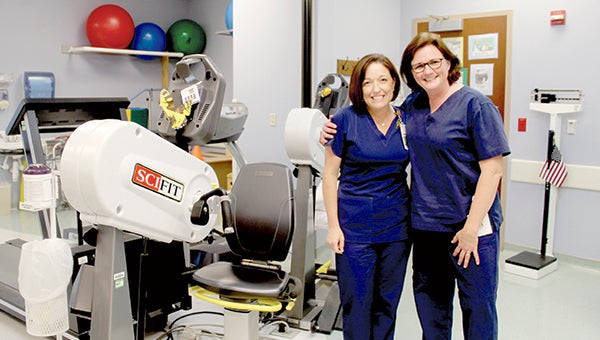Nurses enjoy ‘foxhole friendship’
Published 9:09 pm Saturday, July 9, 2016
By Alyssa Branch
Intern
Lauren Bailey and Sandy Buck have been through a lot together, and during similar — and sometimes parallel — careers as nurses at Sentara Obici Hospital, they helped their patients through a lot, as well.
Bailey and Buck currently run the cardiac rehabilitation department at Sentara Obici Hospital. They help patients through a 12-week, 36-session program to help them regain heart strength and learn to live healthy lifestyles.
These ladies both graduated from The Obici School of Nursing — although in different years, it still brings them a sense of connection. Buck graduated in 1988, and Bailey graduated in 1995.
“I met Sandy on the old cardiac unit, called telemetry, in 1995,” said Bailey, who originally worked nights as Buck worked days. After years of working the cardiac floor, they both moved to the cardiac rehab department — Buck in 1996 and Bailey in 2006.
After working together since the late 1990s they agree that it has been a wonderful experience that has made them close.
Throughout Sentara Healthcare, the working environment can sometimes be intimate and intense, creating what Dale Gauding, a Sentara spokesman, refers to as “foxhole friendships.” The foxhole friendship Bailey and Buck have developed has created a bond like no other.
“Obviously it’s good, since we are still doing it,” Bailey said. “She’s like family to me.”
Buck was one of the first grad nurses to work on this unit. To her, “the satisfaction and happiness of helping people feel better” are the main rewards of the job. Bailey’s favorite thing is getting to know patients personally, as well as seeing good outcomes.
These nurses run the department by themselves, which involves a lot of independent decision-making on their part.
“We try to give the patients a lot of power,” Buck said. If a patient comes in with a problem, the nurses’ goal is to teach them to have the power to call their doctor and do something.
“Every day is a good day, but some days are really good days,” Buck said. “The patients sometimes come here in a funk, but we have to be the positive ones, the cheerleaders for the patients.”
Every patient has his or her own program, since the diversity among patients is extensive.
“We can have a 30-year-old who had a heart attack and no other problems and then the 92-year-old with various issues,” Bailey explained.
Patient conditions can vary greatly. Patients could be on a life vest — a literal vest that acts as an external defibrillator, an LVAD (left ventricular assist device) — the step before heart transplant or HeartMate — or a total artificial heart.
“We exercise our patients and try to get them stronger so that they will continue exercising on their own.” Bailey said. “This program is not a quick fix. It is a lifelong healthy change they need to do in order to keep their hearts healthy.”
The program also offers education on a variety of levels. For example, a Sentara dietitian will come six different times during the 12-week period to teach about low sodium, low fat, label reading and more.
“They are extremely well-trained and knowledgeable of their duties, and above all, interact wonderfully with their patients,” said Merle Monahan of Southampton County, a second-time patient. Monahan said the program is fun and feels almost as if she’s just going to the gym.







